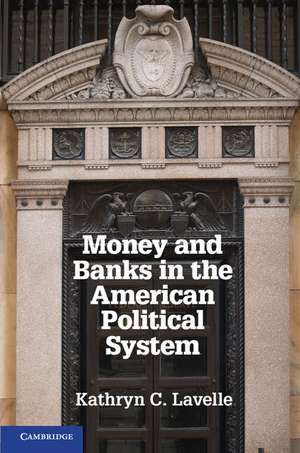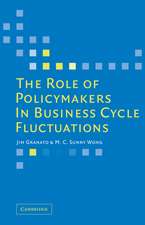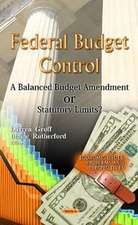Money and Banks in the American Political System
Autor Kathryn C. Lavelleen Limba Engleză Paperback – 13 ian 2013
| Toate formatele și edițiile | Preț | Express |
|---|---|---|
| Paperback (1) | 262.45 lei 6-8 săpt. | |
| Cambridge University Press – 13 ian 2013 | 262.45 lei 6-8 săpt. | |
| Hardback (1) | 555.37 lei 6-8 săpt. | |
| Cambridge University Press – 13 ian 2013 | 555.37 lei 6-8 săpt. |
Preț: 262.45 lei
Nou
Puncte Express: 394
Preț estimativ în valută:
50.22€ • 53.70$ • 41.87£
50.22€ • 53.70$ • 41.87£
Carte tipărită la comandă
Livrare economică 18 aprilie-02 mai
Preluare comenzi: 021 569.72.76
Specificații
ISBN-13: 9781107609167
ISBN-10: 110760916X
Pagini: 324
Ilustrații: 8 b/w illus. 6 tables
Dimensiuni: 152 x 228 x 17 mm
Greutate: 0.42 kg
Ediția:New.
Editura: Cambridge University Press
Colecția Cambridge University Press
Locul publicării:New York, United States
ISBN-10: 110760916X
Pagini: 324
Ilustrații: 8 b/w illus. 6 tables
Dimensiuni: 152 x 228 x 17 mm
Greutate: 0.42 kg
Ediția:New.
Editura: Cambridge University Press
Colecția Cambridge University Press
Locul publicării:New York, United States
Cuprins
1. The institutional foundations of financial politics in the United States; Part I. A Historical Background: 2. Developing state capacity for the conduct of American finance; 3. Creating increasingly complex financial products; Part II. The Bureaucratic Politics and Finance: 4. Making financial policy in Congress; 5. Making financial policy in the executive branch and the federal bureaucracy; 6. Making financial policy in the federal reserve system; Part III. The Operation of the Financial Political Economy: 7. The process in motion: political institutions, money, and the business cycle; 8. The process approaches collapse: politics in the financial crisis of 2008; 9. The process in its international context: political in international institutions; Part IV. Conclusions: 10. Governing the US financial system.
Recenzii
'Why are banks politically powerful in the United States? The novel argument of Lavelle's important book is that banks are powerful because they have allies within the American political system that need banks in order to further their own bureaucratic objectives. For example, the Federal Reserve needs banks to help preserve its independence from the Congress, Congress needs banks to help allocate resources to favored constituents (e.g., homeowners), and financial regulators need banks to help preserve their jurisdictions and budgets. Lavelle's exploration of the bureaucratic politics of financial policy making provides a new understanding of regulation, deregulation, innovation, and crises in American finance.' J. Lawrence Broz, University of California, San Diego
'In this concise volume, Professor Lavelle masterfully dissects and evaluates the politics and institutional drivers of America's evolving banking system. A must-read for political scientists and lawyers alike.' Chris Brummer, Georgetown University
'Lavelle's book usefully illuminates how politically created fragmentation of financial regulation in the United States creates the conditions for recurrent crises. She fills in a huge lacuna in the literature on financial regulation by shifting attention from its effects to its origins and real-world operation in the interaction of Congress and the regulatory agencies.' Herman Schwartz, University of Virginia
'The financial crisis that began in 2008 remains the subject of heated arguments regarding its causes … This new book, grounded in relevant historical developments and guided by a helpful understanding of bureaucratic politics and the distinctive nature of US governments and guided by a helpful understanding of bureaucratic politics and the distinctive nature of US government, brings a refreshingly balanced perspective to the problem. … it sheds light on the most basic causes of US financial instability. Summing up: recommended. Upper-division undergraduate, graduate, research, and professional collections.' M. E. Ethridge, Choice
'In this concise volume, Professor Lavelle masterfully dissects and evaluates the politics and institutional drivers of America's evolving banking system. A must-read for political scientists and lawyers alike.' Chris Brummer, Georgetown University
'Lavelle's book usefully illuminates how politically created fragmentation of financial regulation in the United States creates the conditions for recurrent crises. She fills in a huge lacuna in the literature on financial regulation by shifting attention from its effects to its origins and real-world operation in the interaction of Congress and the regulatory agencies.' Herman Schwartz, University of Virginia
'The financial crisis that began in 2008 remains the subject of heated arguments regarding its causes … This new book, grounded in relevant historical developments and guided by a helpful understanding of bureaucratic politics and the distinctive nature of US governments and guided by a helpful understanding of bureaucratic politics and the distinctive nature of US government, brings a refreshingly balanced perspective to the problem. … it sheds light on the most basic causes of US financial instability. Summing up: recommended. Upper-division undergraduate, graduate, research, and professional collections.' M. E. Ethridge, Choice
Notă biografică
Descriere
Lavelle argues that the political sources of instability in finance derive from the intersection of market innovation and regulatory arbitrage.











